Christian & Jewish
SCENE
Australian Council adds to patron roster
The Australian Council of Christians and Jews has been honoured by the acceptance of its recent invitations to a number of prominent personalities in the interfaith world to join former Governor of Victoria, Dr. Davis McCaughey and a former Governor General of Australia, Sir Zelman Cowen as patrons of the organisation.
|
The 2004 ACCJ Patrons list Revd Professor Robert Anderson AM |
They range from Melbourne benefactor and cultural and communal stalwart, Mrs Jean Pratt to two of Australia?s most outspoken and supportive Rabbis in the cause of interfaith dialogue and education, recently retired Sydney Great Synagogue Rabbi Raymond Apple and the Melbourne Temple Beth Israel?s Emeritus Rabbi, John Levi. The Council is also delighted to have received unconditional acceptance of its invitation of patronage to prominent churchmen, Anglican primate, Dr. Peter Carnley and recently retired Vatican delegate, Cardinal Cassidy who are joined in the list of new patrons by Melbourne?s Revd. Professor Robert Anderson and former Governor General, Sir William Deane.
The Council?s Chairman, Henry Mendelson commented that the support of its prestigious list of patrons will add considerable strength to the work of the ACCJ. in the future. He confirmed that the list of those invited was prepared by the Council?s National Executive after suggested names were called for from each State of Australia. The State Executive, which is made up of each State?s CCJ representatives, ?meets” on a quarterly basis by telephone conferencing since travel costs prohibit the concept of conventional meetings.
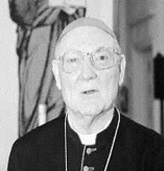 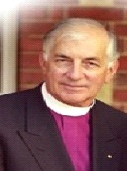 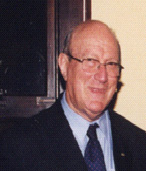  |
| Among those recently accepting ACCJ?s patronage invitation: Cardinal Cassidy, Dr. Peter Carnley, Rabbi John Levi, Sir William Deane |
Church group slams proselytising efforts
The United Church of Canada, the second largest Protestant denomination in Canada and perhaps the most liberal large faith group in the country has been petitioned to come to terms with its past anti-Semitic history and to mend fences with the Jewish community. A report published some 5 year ago, ?Bearing Faithful Witness: United Church-Jewish Relations Today”calls for the Church to stop trying to convert Jews to Christianity; end any Biblical interpretation that negatively stereotypes Jews or leads to anti-semitism or anti-Judaism; to reject the concept that Christianity is superior to Judaism or that Christianity is a replacement for Judaism. Rabbi Reuven Bulka, chairman of the Religious and Interreligious Affairs Committee of the Canadian Jewish Congress said: “”I think it deserves the highest accolades…they have not in any way compromised their own faith, but they have realised failings within the faith and have honestly said 'Let's clean up this mess? The Right Rev. Bill Phipps, moderator of the Church commented: “”Christianity does not supercede Judaism…We are not picking up where they left off”.
|
Editorial This issue of SCENE?s front page report on the United Church of Canada?s resolution to curb its proselitising efforts vis a vis the Jewish community may be somewhat dated but nevertheless carries a vital message for the relationship between certain Christian movements in Australia which go out of their way to target Jews. The need to counter the efforts of these groups? inappropriate activities and the misguided direction which their endeavours takes in today?s multi-faceted and more highly educated society has never been more necessary. In effect what organisations such as the Jews for Jesus movement are still attempting is to downgrade Judaism by negatively stereotyping Jews and attempting to persuade plainly insecure members of the public that Christianity is superior to Judaism or, even more incredibly, that Christianity is a replace- ment for Judaism. In Sydney we have the phenomenon of Jews for Jesus not merely standing on street corners, actively buttonholing any passerby who is prepared to stop and listen; not merely picketing the gates of Universities (having been banned from on campus activities) but opening streetfront premises in the suburb of Bondi, a location directly targeted to the city?s most numerous concentration of Jewish population. Not that there is anything illegal here. Anyone can open a shop and offer ?for sale” any goods or services that fall within the law of the country. What is however questionable and what society is being asked to accept is the obviously predatory influence such activities have on the confused, the weak, the disoriented who more often than not are able to be steered into directions, the implications of which they are reluctant or unable to analyse, indeed of which they are frequently unaware. The message from the Canadians should be seen as universal. Christianity is not the rightful heir to Jewish faith. Rather the message which the UCC has embraced should become the watchword for meaningful understanding of the Christian world by Judaism and of the Jewish world by Christianity. We live in a world today which has no room for organisations or movements which cast aspersions or criticize other faith traditions. We must be ever watchful for such organizations; we must provide the young, the weak and the confused with a clear cut path which diverts them from street corner marketing and from those disseminating dubious dogma. Email address: hdm@idx.com.au |
Anglican Communion Primates? Meeting issues communiqu?Edited version of the communiqu? issued by the Dromantine Conference in Newry, Northern Ireland last month Primates of the Anglican Communion and Moderators of the United Churches, we gathered at the Dromantine Retreat and Conference Centre, at the invitation of the Archbishop of Canterbury, Dr Rowan Williams. We thank God that our meeting has been characterised by generosity of spirit, and a readiness to respect one another?s integrity, with Christian charity and abundant goodwill. The most pressing business facing the Primates? Meeting was consideration of the Windsor Report 2004, in which the Lambeth Commission on Communion had offered its recommendations on the future life of the Anglican Communion in the light of developments in Anglican life in North America. We reflected for many hours on the recommendations of the Windsor Report; we considered a careful analysis of the 322 responses which this group had received from around the Anglican Community. We also wish to make it quite clear that in our discussion and assessment of the moral appropriateness of specific human behaviours, we continue unreservedly to be committed to the pastoral support and care of homosexual people. The victimisation or diminishment of human beings whose affections happen to be ordered towards people of the same sex is anathema to us. We welcome the general thrust of the Windsor Report as offering a way forward for the mutual life of our Communion, and commend the constitutional processes and requirements (vi). We also wish to make it quite clear that in our discussion and assessment of the moral appropriateness of specific human behaviours, we continue unreservedly to be committed to the pastoral support and care of homosexual people. The victimisation or diminishment of human beings whose affections happen to be ordered towards people of the same sex is anathema to us. |
||
|
We welcome the general thrust of the Windsor Report as offering a way forward for the mutual life of our Communion, and commend the constitutional processes and requirements (vi). We also wish to make it quite clear that in our discussion and assessment of the moral appropriateness of specific human behaviours, we continue unreservedly to be committed to the pastoral support and care of homosexual people.
The victimisation or diminishment of human beings whose affections happen to be ordered towards people of the same sex is anathema to us. We welcome the general thrust of the Windsor Report as offering a way forward for the mutual life of our Communion, and commend the following conclusions for dealing with the differences of opinion which have opened up amongst us. We welcome the Section C proposals for the future development of the Instruments of Unity, although we recognise that serious questions about the content of the proposal for an Anglican Covenant and the practicalities of its implementation mean that this is a longer term process. We were glad to be reminded of the extensive precedents for covenants that many Anglican churches have established with ecumenical partners, and that even within our Communion the Chicago/Lambeth Quadrilateral has already been effectively operating as a form of covenant that secures our basic commitment to scripture, the Nicene Creed, the two Sacraments of the Gospel and the Historic Episcopate. We therefore commend this proposal as a project that should be given further consideration in the Provinces of the Communion between now and the Lambeth Conference 2008. In addition, we ask the Archbishop of Canterbury to explore ways of implementing this. We also have further questions concerning the development of the role of the Archbishop of Canterbury, and of a Council of Advice. While we welcome the ministry of the Archbishop of Canterbury as that of one who can speak to us as primus inter pares about the realities we face as a Communion, we are cautious of any development which would seem to imply the creation of an international jurisdiction which could override our proper provincial autonomy. We ask the Archbishop of Canterbury to explore ways of consulting further on these matters. We accept the principle articulated in Section D of the Windsor Report concerning the universal nature of the ministry of a bishop within Anglican polity Although formidable practical problems would attend any formal process of wider consultation in the election and confirmation of bishops, we request that Provinces should themselves find an appropriate place for the proper consideration of the principle of inter-dependence in any process of election or confirmation. We are persuaded however that in order for the recommendations of the Windsor Report to be properly addressed, time needs to be given to the Episcopal Church (USA) and to the Anglican Church of Canada for consideration of these recommendations according to their constitutional processes. Within the ambit of the issues discussed in the Windsor Report and in order to recognise the integrity of all parties, we request that the Episcopal Church (USA) and the Anglican Church of Canada voluntarily withdraw their members from the Anglican Consultative Council for the period leading up to the next Lambeth Conference. During that same period we request that both churches respond through their relevant constitutional bodies to the questions specifically addressed to them in the Windsor Report as they consider their place within the Anglican Communion. (cf. paragraph 8) In order to protect the integrity and legiti- mate needs of groups in serious theological dispute with their diocesan bishop, or dioceses in dispute with their Provinces, we recommend that the Archbishop of Canterbury appoint, as a matter of urgency, a panel of reference to supervise the adequacy of pastoral provisions made by any churches for such members in line with the recommendation in the Primates? Statement of October 2003. Equally, during this period we commit ourselves neither to encourage nor to initiate cross-boundary interventions. In reaffirming the 1998 Lambeth Conference Resolution 1.10 as the present position of the Anglican Communion, we pledge ourselves afresh to that resolution in its entirety, and request the Anglican Consultative Council in June 2005 to take positive steps to initiate the listening and study process which has been the subject of resolutions not only at the Lambeth Conference in 1998, but in earlier Conferences as well. In the meantime we ask our fellow primates to use their best influence to persuade their brothers and sisters to exercise a moratorium on public Rites of Blessing for Same-sex unions and on the consecration of any bishop living in a sexual relationship outside Christian marriage. In the second half of our meeting we addressed some issues of practical ministry… the present situation in relation to the ministry of African churches in particular amongst people living with HIV/AIDS; the dying, the bereaved, and orphaned children. We noted that this serious challenge is faced by all of our churches. Two whole sessions of our meeting were devoted to the important work of the discernment of theological truth and the development and improvement of theological education through the sharing of resources across the Communion. The Archbishop of Canterbury has identified this as a priority concern during the period of his leadership. The work of TEAC (Theological Education for the Anglican Communion) which was established at our meeting in Kanuga in 2001 was reviewed, including the four separate Target Groups which are now engaged with the development of specific education and training programs for bishops; for priests and transitional deacons; for vocational deacons, catechists and licensed lay readers; and for the laity. It is planned to hold a Consultation for theological educators later this year in Canterbury, and it is anticipated that this work will be a significant item of consideration at the Lambeth Conference in 2008. Our common commitment to the pursuit of projects such as these, together with our recent very positive experience of close practical co-operation in response to the tsunami disaster, convince us of the enormous importance of our shared work together as Provinces of the Anglican Communion. Indeed, in the course of our meeting, we have become even more mindful of the indissoluble link between Christian unity and Christian mission, as this is expressed in Jesus? own prayer that his disciples should be one that the world may believe (John 17.21). | |||
Catholic-Jewish dialogue:
|
Letters:I welcome Daphne McLachlan?s letter (?Puzzles of interfaith friendships”) in the December issue. Her frank and honest airing of her concern paves the way for dialogue that hopefully will help her and others resolve her dilemma , i.e. ?The Jewish dietary laws create an invisible but immobile barrier between their adherents and the rest of us [as Anglicans]?. I think it a pity such an obstacle should exist. But if it is the Will of the Almighty for the House of Israel to accept dietary laws as an integral part of religious practice, who am I to query it? The issue is not new. Dietary laws are not unique to Judaism. Buddhists, Hindus, Moslems and possibly others, accept dietary laws as an integral part of religious practice Cat, crocodile, dog, eel, goanna, horse, monkey, seal, snake or whale meat/fish are accepted and popular in some cultures although many Australians may baulk at some or all of them. In some countries animals are not killed for human consumption but deceased feral animals are eaten. In at least one country pig is habitually eaten uncooked. These cultural differences have evolved over very long periods, largely in response to environmental factors. None of them I trust would inhibit me, a Jew, from being a friend with people whose diet includes the aforementioned species and customs. The Jewish dietary laws are a cherished element of Jewish culture. For observant Jews they are at the centre of Jewish life. Many who are otherwise non-observant nevertheless observe the dietary laws either wholly or partly. There is no pecking order, each of us do as we wish. But none of this should inhibit cementing friendships. Where there is a will there is a way. Very broadly there are those who disregard dietary laws completely; those who will not eat proscribed species but disregard other aspects of the laws; those who keep kosher homes but will eat vegetarian or fish (excluding proscribed species) outside the home and those will eat only that which is 100% kosher. This requires not only kosher ingredients: kosher cooking vessels, utensils and crockery, and in the case of restaurants or catered functions independent supervision by a recognised authority are required; and do not fit within any of the above broad descriptions. With individuals I suggest frank enquiry. Most will welcome such consideration and be pleased to give a straightforward answer. If the stated requirements can be accommodated it should be, and almost invariably is, greatly appreciated. But if accommodation is not possible then mutual understanding and respect is the least one should expect. Either way there should be nothing to lose. For larger gatherings at which all should be welcome and comfortable it is desirable to make arrangements which will be acceptable to all.
The International Fellowship of Christians and Jews was founded in 1983 to promote understanding and cooperation between Jews and Christians and to build broad support for Israel and other shared concerns. Based in Chicago and Jerusalem, The Fellowship in recent years has contributed more than $100 million toward Jewish immigration, resettlement and social welfare projects in Israel, as well as funding food, housing and social service programs for Jews in the former Soviet Union and other areas of poverty and distress. FROM DARKNESS TO LIGHT: YAD VASHEM, JANUARY 2005
| ||



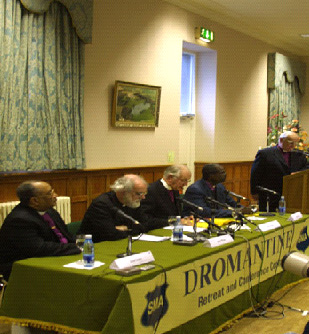
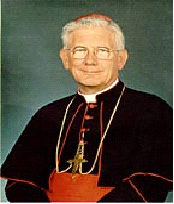 With two very important exceptions, the Shoah and the deeper levels of theological discourse, the agenda for dialogue between Catholics and Jews has been rather remarkably constant since its early days at the time of the Second Vatican Council.
With two very important exceptions, the Shoah and the deeper levels of theological discourse, the agenda for dialogue between Catholics and Jews has been rather remarkably constant since its early days at the time of the Second Vatican Council.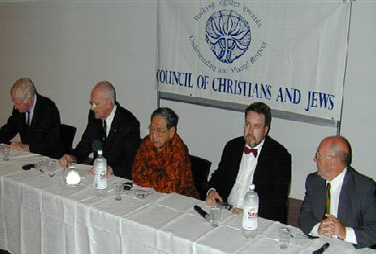
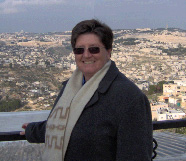 Anyone who has followed the course at Yad Vashem in Jerusalem knows that it is an intense experience. One takes an emotional journey through the darkness and suffering of antisemitism and the destruction of World War II. The cold blooded logistics of the death factories and the intricate planning to kill the maximum number of Jews in a day chill one to the depths. We were thirty four participants from fourteen different countries that included thirteen from Au
Anyone who has followed the course at Yad Vashem in Jerusalem knows that it is an intense experience. One takes an emotional journey through the darkness and suffering of antisemitism and the destruction of World War II. The cold blooded logistics of the death factories and the intricate planning to kill the maximum number of Jews in a day chill one to the depths. We were thirty four participants from fourteen different countries that included thirteen from Au